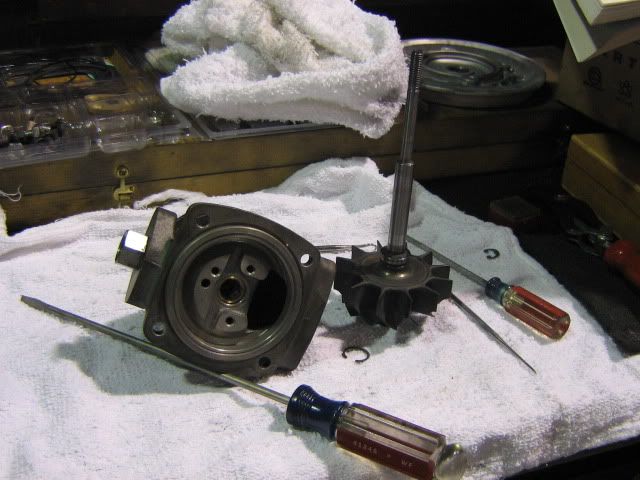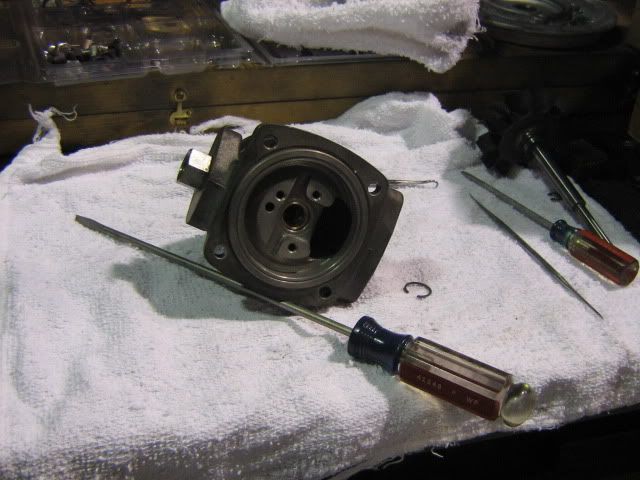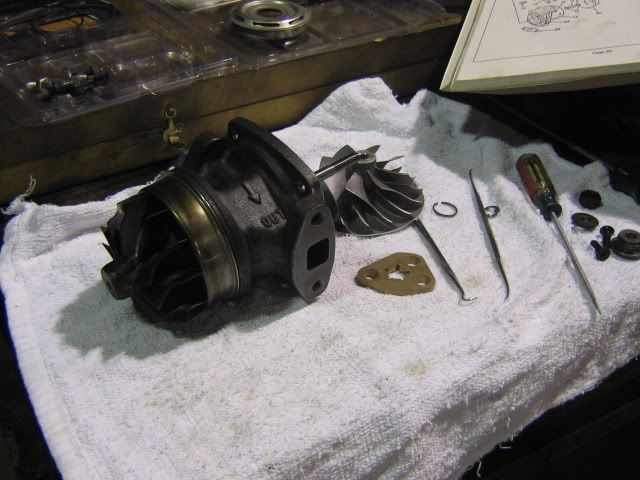Page 1 of 1
Holset Turbo Model Number for 6bta 300?
Posted: Oct 28th, '11, 17:37
by Marshall Mahoney
I have a spare Holset turbo but I can't read the model number. The Assy number looks like 3528781, but I can't find a reference on the internet. I'm thinking that I can rebuild it myself. Does anyone have a contact for parts? If I can't put it back together, does anyone have a rebuild contact?
I have significant black smoke from my starboard engine (getting soot all over my new paint job). Can't find any leaks from the turbo and the air filter is clean. I'll try Uncle Vic's turbo cleaning procedure and see if that helps. Would exhaust back pressure cause black smoke? I don't seem to have any problems with power.
--Marshall
Posted: Oct 28th, '11, 18:00
by In Memory Walter K
Marshall- there is a short hose that I have had pop off, but doesn't look like it has when I lift the hatch to inspect why the sudden black smoke. The hose is very short, about 3 1/2 hose clamps long. Once pushed back into place and re clamped, the condition goes away. The loss of power was subtle. The black smoke isn't. If your turbo can be manually spun at the dock, I suspect the air feed to it might be the culprit. Walter
Posted: Oct 28th, '11, 18:09
by bob lico
the turbo assy. number should be 3538452 which is the upgrade with 1" water supply. when you rebuild the 1" water supply is highly recomended .we have turbo remanufacturer here on long island ( tubochargers inc.) . i don`t see how you could balance the assembly without proper equipment.
Posted: Oct 28th, '11, 22:25
by Harry Babb
Marshall
Like Walter said, if the turbo spins free then there is not much to gain by a rebuild. You can take the housing off of the fresh air intake side and check to see if the Turbine Vanes are rubbing the housing.
Before focusing on the turbo I would suggest that you disassemble and clean the After Cooler. If its dirty and restricting the air flow you get smoke.
But after that......and you have to address the turbo this is what I would suggest.
Grab the shaft and try to move it from end to end by pushing and pulling.....if you have a dial indicator you can measure the "End Play".....just pulling from memory .0015"/.0035" seems like the specs. If the end play is acceptable and the Turbine is not rubbing the housing and the Turbo is spinning free.....its probably in good shape and don't need rebuilding.
But if you find that it does need rebuilding there is nothing to the little rascals. The rebuild kit can be purchased for about $130.00 (again from memory).
Just to tell the whole story, I have not launched my boat since rebuilding. I have ran the engines for about 4 hours just hooked up to a 55 gallon barrel. The turbos sound very good and I don't expect any problems out of them. I don't think they really needed rebuilding....but me being a "Tinkererer" I just had to do it for grins and giggles.
There ain't nothing to them at all....the bearings are just Bronze bushing held in place with snap rings.....not even a press fit.....and the seals are simply Piston Rings little things that expand aganist the housing and run in a groove in the shaft......so simple even a cave man can do it.
You will need a Torx wrench, possibly a propane torch to slightly heat the Turbine to get it off of the shaft and just simple tools like screw drivers and dental pics.
Mine are Holset......take a look at the pics



Posted: Oct 28th, '11, 22:50
by bob lico
harry i was referring to a high speed dynamic balance check which is beyond the means of a do-your - own - thing. you could put the shaft in a "v"block on razors for static balance. i would check it the alternative is not a nice day!
Posted: Oct 29th, '11, 12:57
by Harry Babb
I see your point Bob.....
In my case the Turbo has ran for many many hours.
Upon disassembly it was evident that the blades had not worn aganist the housing or had any damage at all.
I checked the shaft and it was just fine.....and....the Turbines were balanced when they were manufactured.
I don't see that simple change of bearings, thrust plate and seals warrants rebalancing
hb
Posted: Oct 29th, '11, 14:48
by Marshall Mahoney
Thanks for the advice. I'm going to the boat tomorrow and will clean the water side of the aftercooler (I heard the air side is tricky -- but I can't see why) and double check the hoses. As far as rebuilding the spare, I couldn't even get the lock nut off of the turbine. Besides, the rebuild kits that I have seen don't include the turbine (looks expensive). My spare hase some damaged blades.
I also put a check valve in the exhaust. You guys got me worried about seawater sloshing into my enigine. Can't see why, but slightly more back pressure may be contributing.
Posted: Oct 29th, '11, 18:19
by RAWicklund
Marshall,
I used Wartsila Automation in N.O. for my turbos... (volvo) They came highly recommended by the Cannon brothers down here in Houma. I also got a great price IMO.
Ray
Posted: Oct 29th, '11, 20:05
by Brewster Minton
What other website could you get this stuff like this. Thanks Capt. Patrick.
Posted: Oct 29th, '11, 21:59
by bob lico
harry in your case you caught it in time or you did the turbo in the process of a complete engine rebuilt but most of the time we catch a turbo problem the hard way as marshall indicated with the spare. just a slightly bent blade or scraping as you indicated can cause total distruction due to out of balance condition. your a very smart man harry and i am not nit- picking but i think a job like this should a least be check by a turbo shop a then home-owner joe can assemble if he chooses . my opinion but it is a expensive engine to experiment with.
Posted: Oct 30th, '11, 09:09
by Harry Babb
Marshall
Cleaning the water side simply consist of removing the end caps and cleaning the tubes.
To clean the air side you will have to remove the bundle from the housing.
This should be done every couple of years for more than one reason.
The fins will get dirty and restrict air flow but another and just as important reason is to stop and prevent the corrossion and deterioation of the aluminum aftercooler housing.
What you have is an Copper alloy "Bundle" encased in an aluminum housing, sealed with O Rings.....one on each end.
When the aluminum corrodes away you will start getting sea water intrusion into the intake side of your engine.
I believe that I once read a very good article on Tony Athens website, with pics and all, about the proper way to clean and care for these Aftercoolers.
May want to take a look over there on Tonys website.
hb


